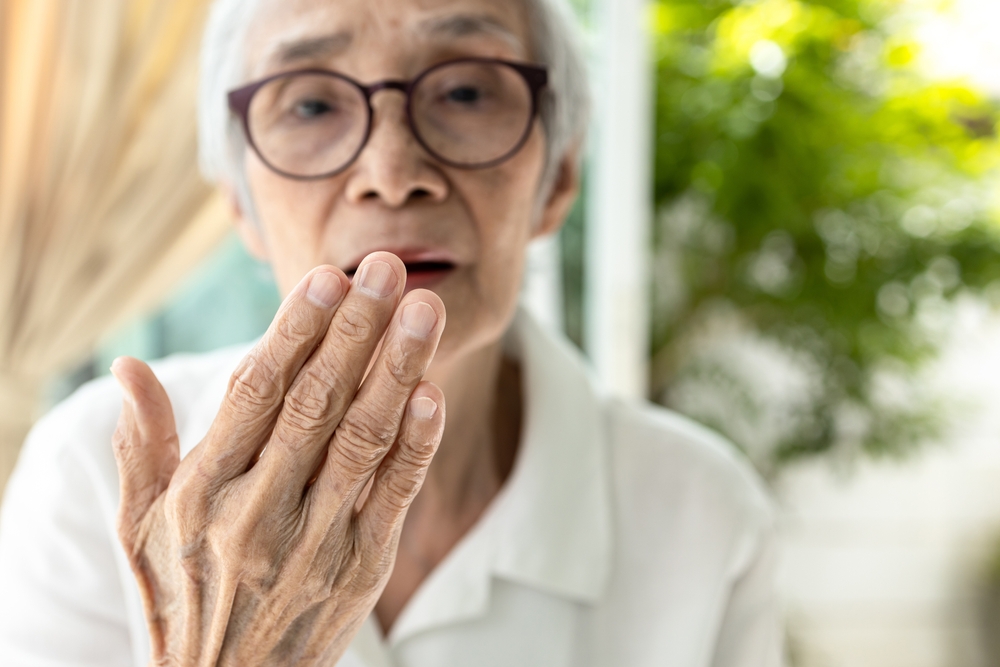Woman With Rare Ability to Smell Disease Detected Her Husband’s Illness 12 Years Early — Now She’s Helping Scientists Create a Test
Last updated on
What if your nose could detect what even the most advanced medical tests miss? Imagine walking into a room and sensing not just a scent but a silent alarm from the body, a signal of something deeply wrong, long before symptoms ever appear.
That’s exactly what happened to Joy Milne, a retired nurse from Scotland, whose extraordinary sense of smell unraveled a mystery no doctor had yet solved. Twelve years before her husband Les was diagnosed with Parkinson’s disease, she noticed something different an unfamiliar, musky scent clinging to his skin. It wasn’t cologne or soap. It was something no one else could perceive and something medicine had no explanation for.
It would take decades, a heartbreaking loss, and the curiosity of scientists to validate what Joy had sensed all along: that illness can leave a trace in the air around us. And that sometimes, the body whispers its warning long before it shouts.
The Woman Who Smelled Illness Before Diagnosis
In 1982, Joy Milne caught the faintest shift in her husband Les’s familiar scent a “musky, dank odor,” as she later told The Guardian. Les was 31, thriving in his career as an anesthetist, and showed no outward sign of illness. Yet Joy, a trained nurse with an unusually acute sense of smell, couldn’t shake the feeling that the odor was more than everyday perspiration. Showers, fresh scrubs, nothing muted it.
Over the next decade that scent became an invisible wedge in their marriage. Joy worried about hygiene; Les bristled at her requests. Friends smelled nothing amiss, and doctors had no answers. What Joy didn’t know then was that her heightened olfactory sensitivity hyperosmia was picking up volatile organic compounds (VOCs) secreted through Les’s skin long before any tremor, stiffness, or mood change appeared.
What’s actually wild is that she could smell Parkinson’s live 10 to 20 years before it reaches peak stage.
— Evil Socrates (@x_socrates1) March 17, 2024
Upon reaching peak stage , Parkinson’s increases secretion of sebum which many hyper sensitive sense of smell people can identify.
This lady is unique. pic.twitter.com/dgjAkQP2b7
The breakthrough moment arrived years later at a Parkinson’s support meeting: the room carried the same greasy-musty note. Every attendee wore it like an aura, and Joy’s uneasy hunch crystallized into certainty. “He’s a doctor we both understood the significance, immediately,” she recalled in a BBC interview. Her private observation had crossed the threshold into a reproducible clue: Parkinson’s disease leaves a biochemical fingerprint that a rare nose can detect.
That realization would launch Joy from bewildered spouse to accidental pioneer. By trusting a sense most of us overlook, she opened a path to diagnosing a disease that affects an estimated 153,000 people in the UK alone and is notoriously hard to confirm in its earliest stage. Her story reminds us that sometimes the first alarm is not a lab result but a subtle whisper the body releases someone is keen enough, and brave enough, to notice.
From Domestic Disputes to Scientific Validation
A woman who can smell Parkinson’s disease is using her hyperosmia — an enhanced sense of smell — to help diagnose the degenerative disease early as part of a study funded by the Michael J. Fox Foundation.https://t.co/60ehqkV0nO via @people
— BirdieBittern (@BirdieBittern) March 30, 2025
At first, Joy Milne’s observations weren’t met with wonder they were met with doubt, even resistance. The smell that she insisted clung to her husband wasn’t just unverified by others it was invisible to the tools and language of medicine at the time. In their home, what Joy sensed became a point of tension. Les, a doctor himself, grew frustrated. He couldn’t smell anything unusual, and Joy’s repeated comments about his hygiene began to wear thin. “He would stomp off in a huff and say, ‘Oh, stop going on about that!’” she recalled.
But the odor never faded. It grew more intense, and alongside it, Les began to change in other ways small mood shifts, a subtle erosion of his patience and warmth, signs that were easy to attribute to stress or aging but which Joy now suspects were early neurological changes. These moments, confusing at the time, later became part of a pattern that only hindsight could clarify.
It wasn’t until after Les was diagnosed with Parkinson’s disease at the age of 45 that Joy’s long-held suspicion began to make sense. Her pivotal moment came during that visit to a Parkinson’s support group, where she recognized the exact same musty smell on others in the room. That was when Joy and Les both medically trained understood what it might mean. They realized that the scent she noticed years earlier could have been a biomarker of the disease.
Eager to explore the possibility, the couple approached Dr. Tilo Kunath, a Parkinson’s researcher at the University of Edinburgh. Initially, he was skeptical. “I just dismissed it,” Kunath later admitted. “It didn’t seem possible. Why should Parkinson’s have an odor?”
But months later, inspired by studies showing dogs could detect cancers through scent, Kunath reconsidered. He designed a blind test: patients with Parkinson’s and healthy individuals wore T-shirts overnight, and Joy was asked to identify which belonged to whom based solely on smell. She was remarkably accurate, even flagging one control participant as having the scent, though he had no diagnosis at the time. Months later, that man was formally diagnosed with Parkinson’s, confirming her perception.
That test changed everything. Joy’s ability was no longer anecdotal it was measurable, repeatable, and grounded in science. Her “superpower,” once dismissed as imagination or over-sensitivity, became the foundation for a new kind of inquiry. Researchers began to ask not whether disease has a scent but what, exactly, is causing it.
Collaborating with Researchers to Decode the Scent
In 2015, a woman named Joy Milne claimed she could smell Parkinson's disease. She first noticed the smell after her husband’s musk changed.
— Morbid Knowledge (@MorbidKnowledge) March 17, 2024
After her husband was diagnosed with the disease, the pair attended a support group for individuals with Parkinson’s.
During the first… pic.twitter.com/kW7i2NYfLZ
After the initial T-shirt experiment, Joy began collaborating with scientists at the University of Manchester, including analytical chemist Professor Perdita Barran. Their focus turned to sebum the waxy, oily substance naturally secreted by the skin. Sebum is rich in volatile organic compounds (VOCs), many of which can change subtly as the body responds to disease. Researchers hypothesized that Parkinson’s disease might alter the chemical profile of sebum in a distinctive way.
To test this, the team collected skin swabs from the backs of participants’ necks, where sebum production is relatively stable. Using a technique called mass spectrometry, they analyzed samples from 79 individuals with Parkinson’s and 71 without. The results were striking: of approximately 4,000 compounds detected, 500 were significantly different in the Parkinson’s group.
It was, as Professor Barran described, “a molecular fingerprint” of the disease. And it validated what Joy had been sensing all along. Her ability seemed otherworldly at first, but science revealed it to be entirely biological. The scent of Parkinson’s was real, and now it could be traced not just to the nose, but to the lab bench.
This collaboration didn’t end with a single experiment. Joy continued working with researchers, helping them refine their understanding of the scent’s nuances. Her contributions earned her co-authorship on scientific papers and recognition within the medical community not just as a subject of study, but as an active participant in the research process.
Their efforts culminated in the development of a prototype diagnostic test: a simple cotton swab rubbed along the neck and analyzed for key chemical markers. Under lab conditions, the test has shown 95% accuracy. The next challenge lies in translating that precision to clinical settings such as hospital laboratories, general practice offices, and routine screening facilities.
Joy’s story is not just a woman with a rare gift, but a partner honoring a promise to her late husband. “We should have been enjoying retirement,” she once said. “But Parkinson’s had stolen our lives. When Les died, he made me promise I’d carry on.” And so she has, transforming personal grief into a catalyst for groundbreaking science.
A New Frontier in Diagnosis: From Scent to Skin-Swab Testing

Scientists at the University of Manchester developed a prototype test that harnesses the biochemical signature she first detected with her nose. The process is straightforward: a medical professional uses a cotton swab to collect sebum from the back of a patient’s neck, where sebaceous glands are especially active and consistent in secretion. The sample is then analyzed using mass spectrometry to detect specific volatile organic compounds (VOCs) that are now known to differ significantly in people with Parkinson’s.
In controlled lab conditions, the test has proven remarkably accurate around 95% making it one of the most promising tools yet for diagnosing Parkinson’s at a much earlier stage. According to Professor Perdita Barran, who led the study, the goal is now to adapt the test for use in real-world clinical settings, with hopes of introducing it into the UK’s National Health Service within the next two years.
The implications are enormous. Early detection could allow patients to begin symptom-managing treatments, adopt lifestyle changes, and plan more effectively for their future. It could also enable researchers to better study the disease in its earliest stages, potentially leading to more effective interventions or even preventive therapies down the line.
Importantly, this approach isn’t limited to Parkinson’s. Joy’s work has sparked global interest in the use of olfactory biomarkers to detect other diseases. Dogs have been trained to smell cancers; researchers are exploring whether similar scent-based changes might help identify conditions like Alzheimer’s, tuberculosis, or diabetes. The “electronic nose” field devices that mimic human olfaction is rapidly growing as a result.
Still, experts urge caution. As Dr. Richard Doty, director of the Smell and Taste Center at the University of Pennsylvania, notes, odor can be influenced by many factors diet, medications, age, hygiene and must be studied carefully before being accepted as definitive. But while smell may not replace traditional diagnostics, it could offer a powerful complement to existing methods especially for diseases with subtle early symptoms.
The Human Cost of Delayed Diagnosis and the Hope of Earlier Detection

For Joy Milne, the science is inseparable from the sorrow. Her discovery was not born from curiosity, but from the long, slow unraveling of the man she loved. By the time Les Milne was formally diagnosed with Parkinson’s, nearly twelve years had passed since Joy first noticed the strange, sour change in his scent. That delay cost them time, time that, had they known sooner, might have been lived differently.
“We would have spent more time with family. We would have travelled more,” Joy has said, reflecting on those lost years. What began as a subtle change in odor evolved into something deeper and more devastating: shifts in mood, tension in the marriage, and ultimately, the painful recognition that the disease had been progressing unnoticed and unexplained.
Parkinson’s doesn’t just affect movement. It can cause depression, anxiety, sleep disturbances, and personality changes that ripple through relationships and daily life. Without a clear diagnosis, these symptoms can be misinterpreted as character flaws, marital issues, or aging rather than the neurological red flags they are. The result is often confusion, isolation, and missed opportunities for early intervention.
By the time Les received his diagnosis in his mid-40s, many of the subtle but telling signs had already intensified. Treatment options existed, but much of the damage had been done. The loss was not only physical, it was emotional, relational, and existential. And while Joy has been hailed as a pioneer for her role in developing the diagnostic swab, she remains acutely aware of the personal toll the delay took. “Les and I should have been enjoying retirement,” she once said. “But Parkinson’s had stolen our lives.”
That loss, however, has become her driving force. In helping scientists develop an early diagnostic tool, Joy is fighting not only for medical progress, but for others to avoid the painful path she and Les walked. Early detection represents not only a medical advance but a profound human gain. It means more time for families to prepare, more clarity for navigating behavioral changes, and more dignity for those living with a disease that so often erodes independence and identity.
Trusting Our Senses and Honoring Our Instincts

Joy Milne’s experience stands as both a scientific breakthrough and a reminder of how attention, intuition, and persistence can change what we know about disease. Her ability to detect Parkinson’s by smell may be rare, but the lesson behind it is profoundly universal: sometimes, our bodies and our relationships give us clues long before medical charts catch up.
For years, Joy’s observations were dismissed not because she lacked evidence, but because they defied the boundaries of what was considered possible. Yet she refused to ignore what she sensed. And because she trusted that quiet, persistent signal, thousands may now benefit from earlier, more compassionate diagnoses. In a world increasingly reliant on high-tech scans and algorithms, Joy’s story is a powerful call to value our oldest tools, our senses, our awareness, and our connection to those we love.
Too often, early symptoms of illness especially those that don’t fit textbook patterns are explained away. A mood shift is chalked up to stress. A physical change becomes a minor annoyance. A strange new scent? Just the laundry detergent. But Joy’s journey challenges us to pause, to listen, and to question. Not every instinct is correct but some are the start of something life-changing.
As researchers now explore scent-based diagnostics for everything from cancer to Alzheimer’s, Joy’s role reminds us that observation is still foundational to discovery. Her story isn’t one of superhuman ability. It’s a reminder of the insight that comes from paying attention when no one else is looking.
In the end, this isn’t just a tale of science. It’s a lesson in presence. It asks us: What are we overlooking in our daily lives? What might our bodies or the bodies of those we care about be trying to tell us?
The future of medicine may include machines that mimic the nose, sensors that detect invisible molecules, and AI that sifts through chemical signals. But none of that would exist without one woman paying attention to something she couldn’t explain but refused to ignore.
So trust what you notice. Ask the uncomfortable question. Sit with the unexplained. And when something doesn’t feel or smell right, don’t be so quick to dismiss it. Like Joy Milne, you might be the first to detect what the world hasn’t yet learned to measure.
Featured Image via https://x.com/Bio_comunidad
Some of the links I post on this site are affiliate links. If you go through them to make a purchase, I will earn a small commission (at no additional cost to you). However, note that I’m recommending these products because of their quality and that I have good experience using them, not because of the commission to be made.

































 JOIN OVER
JOIN OVER
Comments